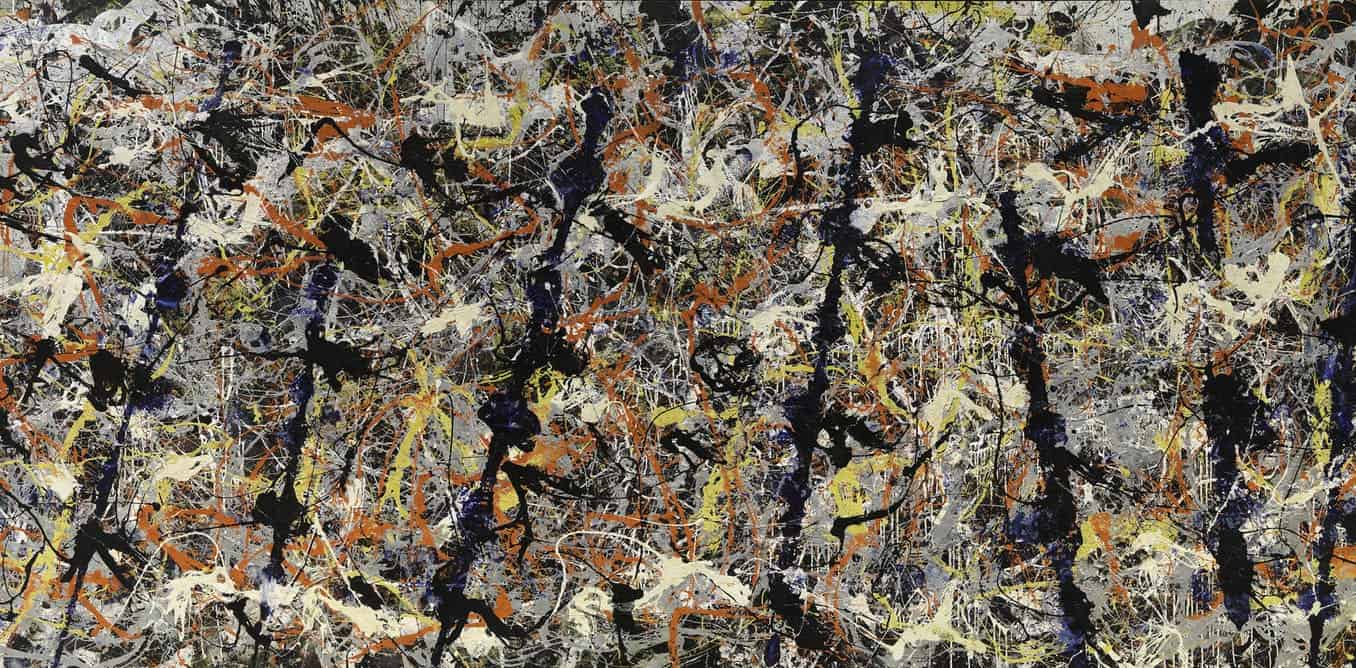
Jackson Pollock masterpiece Blue Poles goes under the microscope
Published: December 9, 2015 2:11pm EST LinkedIn So, what is the story with Jackson Pollock's Blue poles? You know the painting - that big canvas, more than two metres high and almost five.

Jackson Pollock Famous Paintings Blue Poles
Jackson Pollock is the most important figure of American Abstract Expressionism, and "Blue Poles" is his last masterpiece, the culmination of his artistic career. Labeled "America's greatest painter" by Life Magazine (1949), Pollock created his best works -his famous drip paintings- between 1947 and 1950. After those fertile years.

PollockBluePole
At the time of sale the art world was typified by a conservative climate, and the high purchase price, as well as the painting itself, created a political and media scandal, which was capitalized upon by the National Gallery of Australia, who bought the painting.

Blue Poles by Jackson Pollock Top 8 Facts
Blue Poles, originally titled Number 11, 1952, is an abstract expressionist painting and one of the most famous works by Jackson Pollock. It was purchased amid controversy by the National Gallery of Australia in 1973 and today remains one of the gallery's major holdings.

Here's looking at Blue poles by Jackson Pollock
Blue Poles, mixed media painting on canvas created in 1952 by American Abstract Expressionist artist Jackson Pollock. It is one of the best known of the artist's work and was painted on a canvas stretched on the floor of his studio. Pollock was born in Cody, Wyoming, the youngest of five sons.

Jackson Pollock's Blue Poles unveiled after restoration following
Blue Poles, also known as Number 11, 1952 is an abstract expressionist painting by American artist Jackson Pollock. It was purchased amid controversy by the National Gallery of Australia in 1973 and today remains one of the gallery's major paintings.

Blue Poles painting by Jackson Pollock Britannica
The Blue Pole was painted on a large roll of prepared canvas that measured 489.5 centimetres wide and 213 centimetres high, using brightly coloured household paints. Colour and Chaos Pollock was a man of few colours regarding the Blue Pole. He used the standard colours of commercially produced enamel paints.

A woman walks past 'Blue Poles', 1952 by Jackson Pollock during a
Jackson Pollock's Blue poles is now worth a whopping $500 million, according to a new valuation by its keeper, the National Gallery of Australia. Blue poles, by Jackson Pollock. Getty Images

Blue poles by Jackson Pollock ABC News (Australian Broadcasting
Passenger ferries docked on the Buriganga during a Covid lockdown imposed by the government. Photograph: ZUMA Press, Inc./Alamy. New roads made travel and trade easier and Asad reaped personal.

hd image Jackson Pollock. Blue poles. 1952 Peter Paul Biro Forensic
Blue Poles, also known as Number 11, 1952 is an abstract expressionist painting by American artist Jackson Pollock. It was purchased amid controversy by the National Gallery of Australia in 1973 and today remains one of the gallery's major paintings. Title

Arty Facts Jackson Pollock’s ‘Blue Poles’
The last monumental abstract painting by American artist Jackson Pollock, Blue poles became part of Australia's emerging national art collection in 1973 amid much controversy. Painted four years before the artist's death in 1956, the purchase price of US$2 million (then equivalent to A$1.3 million) set a new record for Pollock and was, at the time, the most expensive American painting ever.

Out of the Blue The Work of Art » ACTION REACTION Jackson Pollock
Documentary directed by Alison ChernickThe last monumental abstract painting by American artist Jackson Pollock, 'Blue poles' 1952 became part of Australia's.

Jackson Pollock Blue Poles
Blue Poles by Jackson Pollock - Top 8 Facts By: Trace Bradley Published: July 21, 2022 One of the most famous paintings of Jackson Pollock, the leading Abstract Expressionist artist of the 20th century, actually has a title.

Pin on Art
Blue Poles is often referred to as Number 11, 1952 and is considered one of Pollock's finest paintings from his abstract series. The original artwork is now on display at the National Gallery of Australia where it has been since 1973.

Recreating Jackson Pollock in 2021 Large abstract painting, Jackson
Blue Poles by Jackson Pollock, owned by the National Gallery of Australia, has been valued at an astounding $500 million. What is the meaning of Blue Poles by Jackson Pollock? Blue Poles is a manifestation of Pollock's concepts of the unconscious and pure painting. Throught the vigor and magnitude of Blue Poles, we can virtually enter Pollock.

Jackson POLLOCK 'Blue poles' (Number 11, 1952) 1952 YouTube
It measures 213 centimetres high by 489.5cm centimetres wide and weighs 99 kilograms. Blue poles was purchased from New York collector Ben Heller for Australia's national collection in 1973. Jackson Pollock painted Blue poles using flung and dripped lines of brightly coloured household paints.